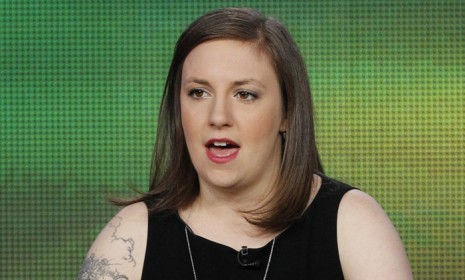Lena Dunham confronts the Girls racism controversy: Is she convincing?
The writer and star of HBO's breakout series says it primarily features white characters because that's the only experience she knows. Critics are split on her rationale

A free daily email with the biggest news stories of the day – and the best features from TheWeek.com
You are now subscribed
Your newsletter sign-up was successful
After debuting to hyperbolic praise, the new HBO series Girls faced its first backlash from critics decrying its caucasian-centric depiction of New York City. The startlingly honest comedy — which 25-year-old Lena Dunham created, directs, writes, and stars in — follows four twenty-something white friends navigating post-grad life in New York City. But with non-white characters unrealistically absent from early episodes, critics complained that a series packaged as "the twenty-something experience" had "a serious problem when it comes to race." Dunham directly addressed those critiques in an interview with NPR, arguing that she based the show on her own experiences as a "half-Jew, half-WASP." She felt she couldn't write truthfully about an African American girl living in New York, and wanted to avoid tokenism when casting the show. Should her defense satisfy critics?
The response is perfect: Dunham's NPR interview shows just how smart she is, says Amos Barshad at Grantland. She's completely aware, and also apologetic, that she wasn't able to provide viewers with a "truly all-encompassing rendition of young girls in New York right now." More importantly, she realizes that her show gives her a massive platform, acknowledges her "responsibility to be fair with that platform" and promises that people of color will be more prominent in season two. So we'll have to wait until next year to see if she and her co-writers pull it off. "But at least she's listening."
"Lena Dunham talks about Girls being super white"
The Week
Escape your echo chamber. Get the facts behind the news, plus analysis from multiple perspectives.

Sign up for The Week's Free Newsletters
From our morning news briefing to a weekly Good News Newsletter, get the best of The Week delivered directly to your inbox.
From our morning news briefing to a weekly Good News Newsletter, get the best of The Week delivered directly to your inbox.
She's making it worse: Dunham's only backing herself further into a corner, says Molly Friedman at Wetpaint. There are basically two ways to read her statement: Either she can't write about African American women because she's not one, or because she doesn't know one. Neither is a valid excuse. While Girls is appealing because its dialogue rings so true — likely a byproduct of a writer who's speaking from experience — TV writers have scripted characters different than themselves for decades. Girls' problem doesn't stem from Dunham's lack of experience outside her own race. It suggests, simply, a "lack of imagination."
"Lena Dunham responds to Girls' race-related criticism: 'This is a hard issue'"
Dunham couldn't win either way: If Dunham doubts her ability to convey the experiences of well-rounded black characters, as she says, says Jenee Desmond-Harris at The Root, it's for the best that she didn't even try. After all, we're often quick to complain about negative, stereotypical portrayals of black women in Hollywood, and we'd be just as quick to "throw her under the bus if she did cast a 'token' black girl and got it wrong."
"Girls creator explains lack of color"
A free daily email with the biggest news stories of the day – and the best features from TheWeek.com
Kevin Fallon is a reporter for The Daily Beast. Previously, he was the entertainment editor at TheWeek.com and a writer and producer for TheAtlantic.com's entertainment vertical. He is only mildly embarrassed by the fact that he still watches Glee.